Best dog conditioners 2025 for a shiny coat and nourished skin
The best dog conditioners will give your pooch a shiny coat, while also combating matted fur and dry skin.
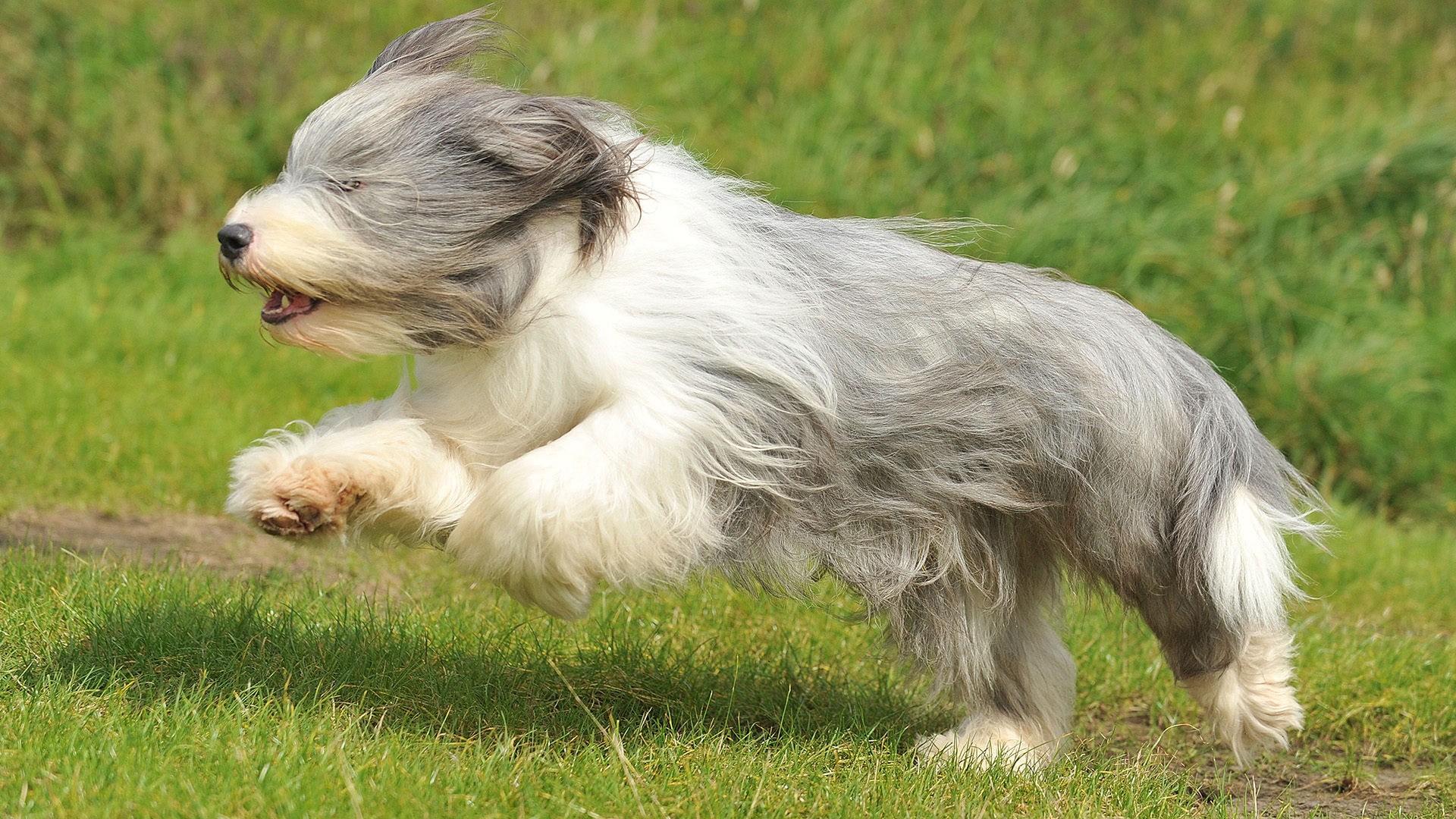
Buying one of the best dog conditioners may feel like an extravagance, especially when you’ve got a thousand other things to consider. But, as well as helping pooches to look their best, a good conditioner can be a time-saver and provide some real health benefits too. It can also make your dog’s coat shinier and easier to manage, according to expert vet Dr Rebecca MacMillan.
Indeed, when combined with the best dog shampoo, you’ll discover that a conditioner makes a canine’s coat look gorgeously shiny while helping to prevent or restore dry and itchy skin. A dog conditioner also allows natural oils to be produced so that any dirt simply slips away and, by preventing the hair from matting and tangling, conditioners help avoid potential sores and infections.
To that end, then, a conditioner should form part of a solid grooming routine, making it a great addition to the best dog grooming kit or best dog nail files. So let’s take a look at our pick of the best dog conditioners on the market today with comments from Dr Diana Hasler, and advice from Dr MacMillan on how best to use them.
The best dog conditioners we recommend in 2025
Why you can trust PetsRadar
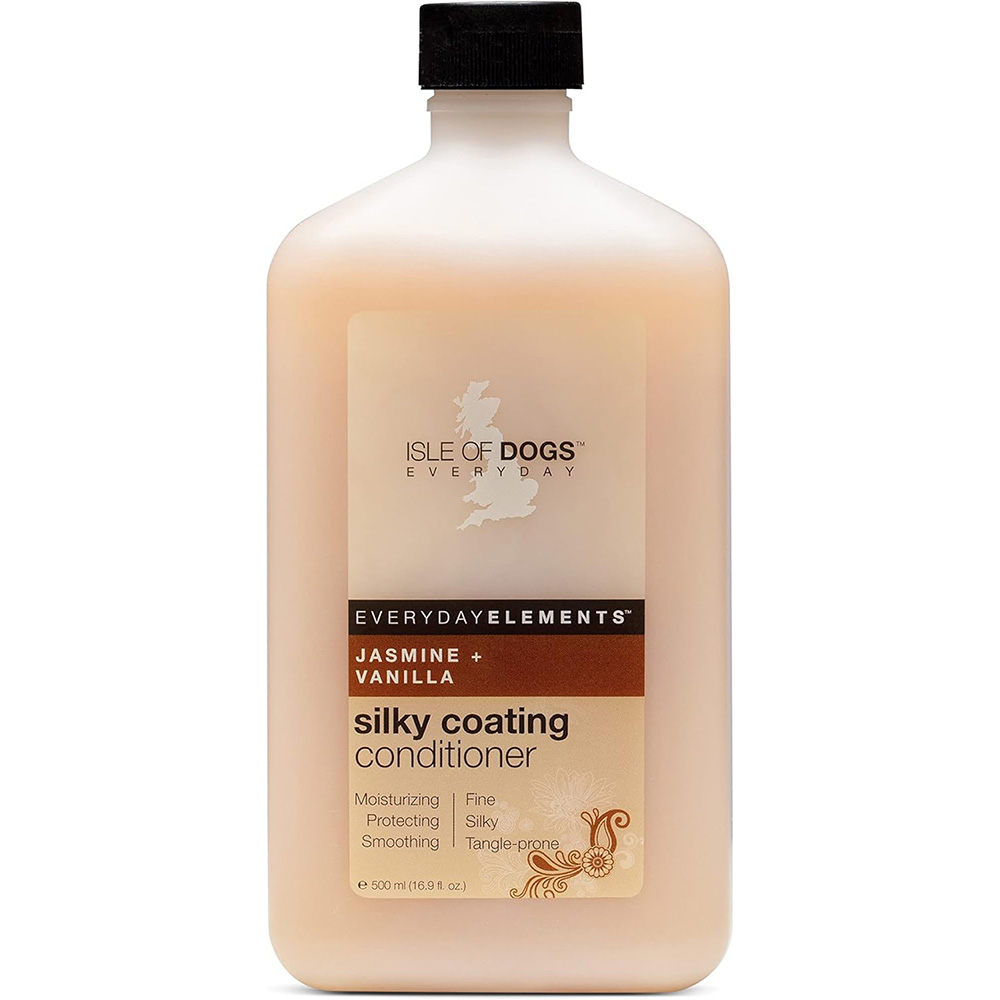
Best overall dog conditioner
If you want to feel like you're giving your pup a bath in a fancy dog spa, you’re likely to be impressed by this conditioner’s seductive scent as well as it’s power to leave your pet’s fur feeling soft and shiny. Although the jasmine and vanilla smell is quite strong when it’s in the bottle, once it’s been applied to your dog’s fur it becomes rather subtle. It also lasts long after application, helping to keep your pet feeling and smelling fresh.
“Since the conditioner contains castor oil, it’s able to provide and retain moisture in the coat and skin,” Dr Hasler explains. The product also contains soothing aloe vera juice but the presence of fragrances and DMDM hydantoin (a preservative) can cause irritation so be wary if your dog has sensitive skin. Bear in mind, too, that the product isn’t specifically “tear-free” so always avoid your dog’s eyes.
Reasons to buy: It leaves coats soft and shiny and it has a long-lasting scent.
Reasons to avoid: It may not be suitable for very sensitive skin and it’s not specifically tear-free.
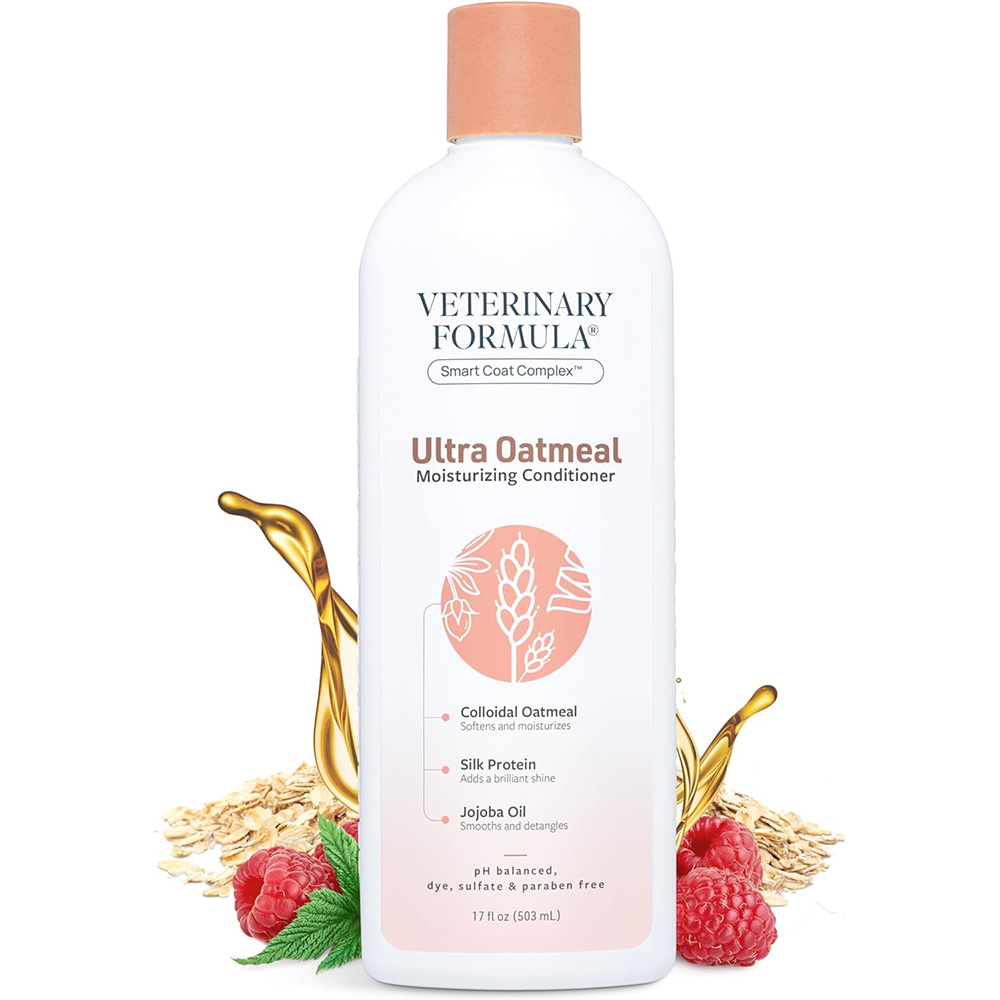
Best dog conditioner for itchy skin
Aimed at dogs suffering from dry, scaly or itchy skin, this fast-acting, gentle and nourishing conditioner will help to reduce redness and swelling. Enriched with soothing colloidal oatmeal and free from parabens, soaps and dyes, this lovely veterinary-recommended conditioner will hydrate your dog's skin and coat and penetrate deep into the hair fibers to add strength and shine.
Safe to use in conjunction with topical flea treatments and capable of soothing skins affected by insect bites (as well as allergies and dirty or wet coats), the conditioner is designed to be used over three months and it becomes more effective if you use the brand’s shampoo as well. With lactic acid and allantoin adding moisture and wheat germ oil providing vitamin E, all in all, this is a highly effective, affordable conditioner and, since it can also be used on cats, it makes for a particularly good buy in multi-pet households.
Reasons to buy: This conditioner hydrates and moisturizes while adding strength and shine to the hair.
Reasons to avoid: It lathers well but it has a rather thin consistency.
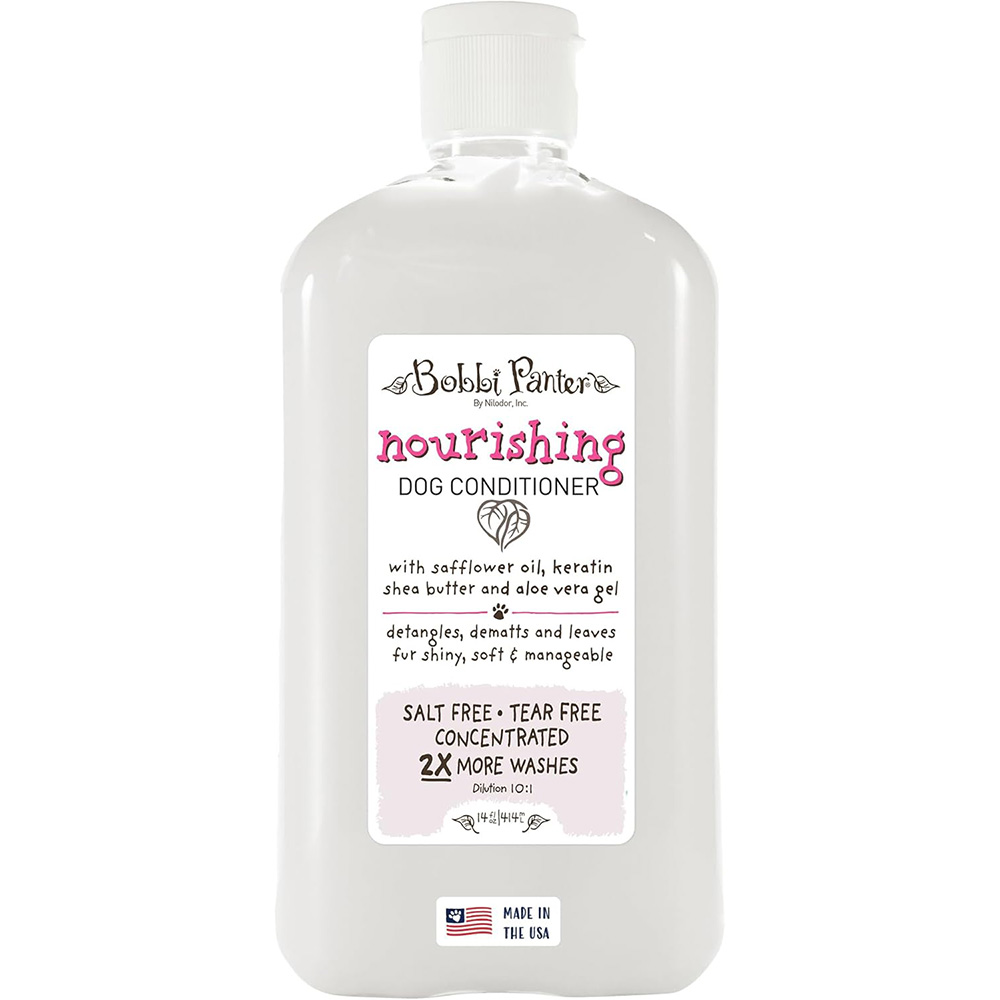
Best dog conditioner for matted hair
This fragrant conditioner features a nourishing formula made with safflower oil, keratin shea butter, and aloe vera oil and that makes it ideal for tackling even the hardiest of long, matted hair. Simply put a dollop on your hand and run it through your pup's hair or mix it with water and you’ll quickly make your dog's hair feel soft and silky. The long-lasting scent is also likely to hang around for days which is great news if you love the soft sea fragrance. Some pet owners have reported that it can come off synthetic, however.
“This product contains beneficial ingredients such as shea butter, safflower oil (a source of omega-6 fatty acids), vitamin B5, aloe vera extract, and hydrolyzed keratin to moisturize your dog’s skin and coat,” says Dr Hasler. It makes it ideal for short-haired canines too whose coats require plenty of moisture but be aware that, while labelled tear-free, you should still avoid a dog’s eyes.
Reasons to buy: Effective at detangling matted hair, this fast-drying conditioner leaves coats soft and shiny.
Reasons to avoid: While it is ideal for both short and long coats, it has what some may describe as a synthetic fragrance.
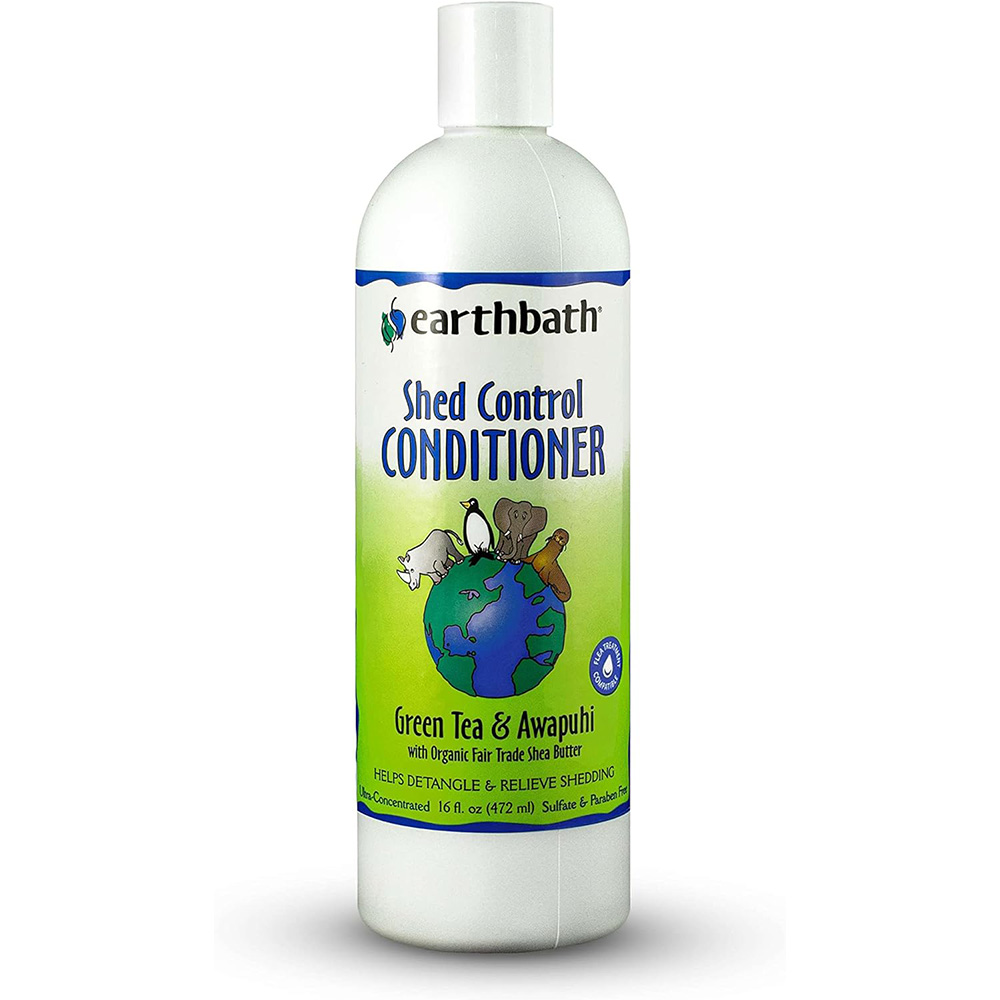
Best dog conditioner for controlling shedding
Earthbath's soap-free formula is ideal for owners who are concerned about harsh chemicals being present in their pup’s conditioner. This product is also free from parabens, dyes, sulphates, phthalates and alcohol, with the natural and organic formula working a treat on creating a soft and shiny coat on even the most sensitive of pups.
It’s key selling point, however, is that it softens, detangles and enriches coats and that should prevent too much shedding and dander – you won’t need to get as handy with your vacuum cleaner if you use this one. We like that it contains shea butter, glycerin and allantoin that nourish the skin and reduce scaling and dryness. It also contains omega-6 fatty acids that can protect and repair the skin. It won’t affect any flea applications either.
Reasons to buy: You can use this conditioner to control your dog’s shedding while leaving the coat shiny and soft.
Reasons to avoid: As with all conditioners, contact should be avoided with your pup’s eyes, nose, and mouth and the inside of their ears.
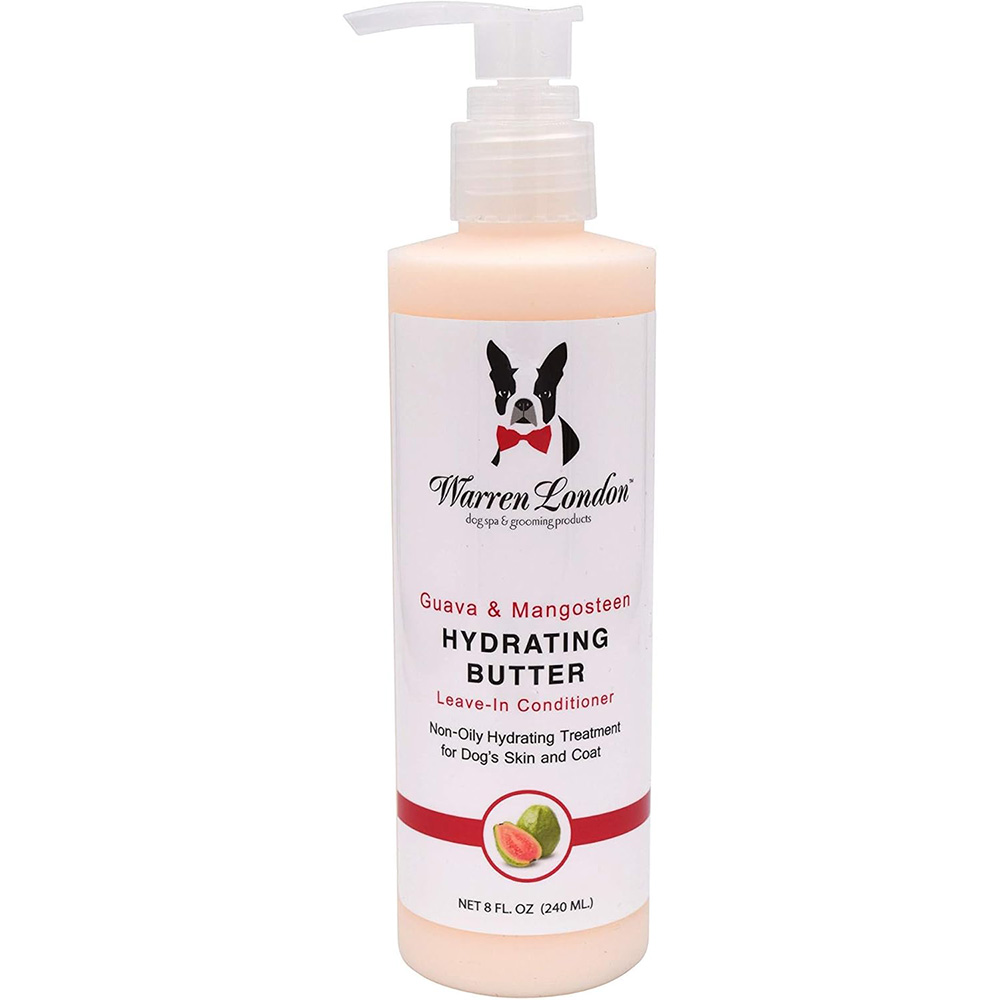
Best leave-in dog conditioner
One look at this stylish bottle and you may think it’s designed for humans. But that’s the point – this is like a canine version of a L’Oriel conditioner and you’d buy it because your dog is very much worth it. Available in one of two scents – pomegranate/acai or guava/mangosteen – you can be assured of a tantalizingly tropical fragrance.
“Since it contains synthetic fragrances and coloring, however, you may want to avoid using it on dogs with sensitive skin,” notes Dr Hasler.
That said, whether your dog suffers from allergies or dry, dull skin, the formula will work a treat, helping to restore moisture and keeping their coat feeling super soft. You’ll also benefit from it being a leave-in conditioner. This gets around a dog’s fear of being rinsed with water and you can rest assured that the glycerin and aloe vera will get to work on moisturizing the skin and is feeling and smelling fresh without any of the trauma.
Reasons to buy: It’s a luxurious conditioner that has multiple tropical scents and a great selection of matching products.
Reasons to avoid: It comes in a small bottle and it may not be suitable for dogs with sensitive skin.
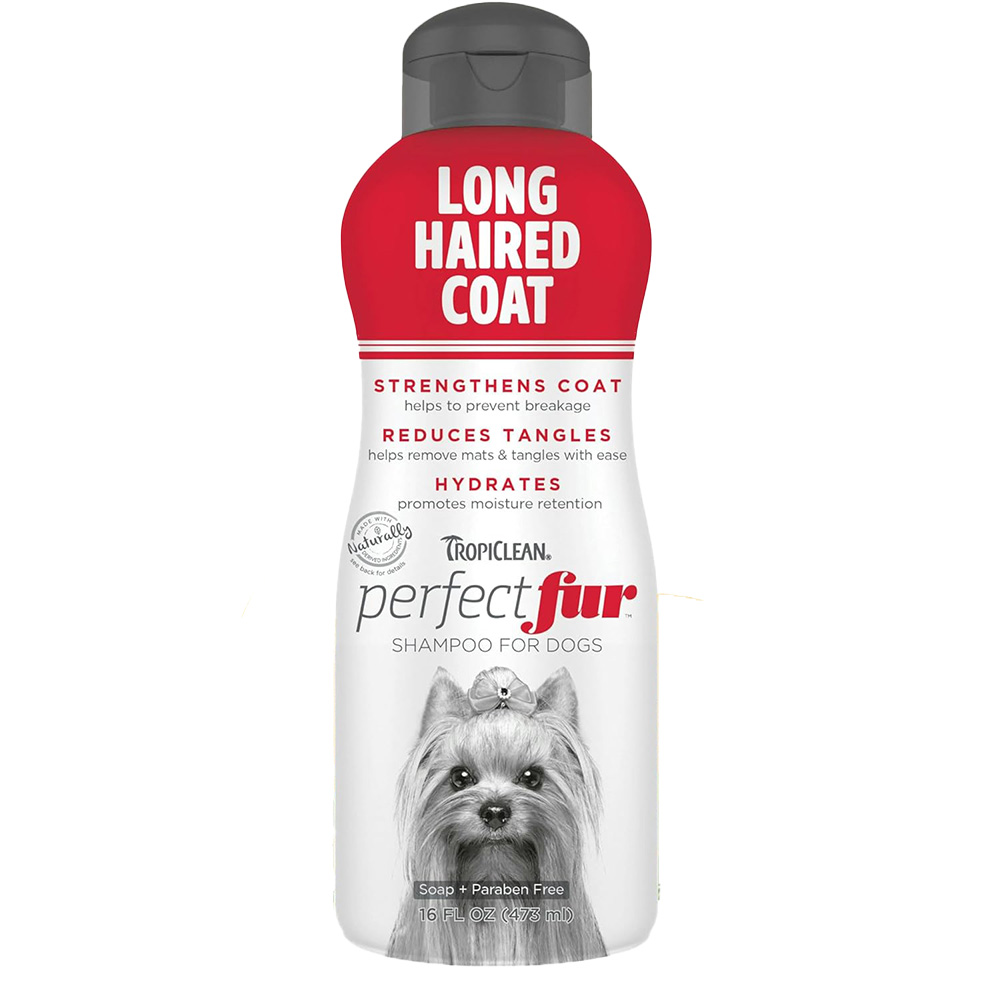
Best dog conditioner for long hair
“Although this product is labeled as a shampoo, it contains ingredients that moisturize and detangle long haired coats,” says Dr Hasler.
Enriched with soothing colloidal oatmeal, super moisturising jojoba oil, and silk proteins and shea butter to hydrate your dog's skin and coat, it’s capable of penetrating deep into the hair fibres to add strength and shine and, as well as ensuring the coat looks and feels silky soft, it will also help to tackle dry, scaly or itchy skin.
Sulfate-free, paraben-free and pH balanced, this formula is safe to use in conjunction with topical flea treatments. And, while it is a little thinner in consistency than some other brands, the long-lasting raspberry tea and pomegranate fragrance last for days and will have your canine companion smelling their best. You can also buy versions that tackle curvy and wavy hair, short double coats, thick double coats, smooth coats and combination coats. There is something for all breeds.
Reasons to buy: It’s a specialist product that lathers well and can improve the overall quality of the coat.
Reasons to avoid: If you want your dog to smell fresh, then you may want to find a product with a stronger scent.
How we chose the best dog conditioner
When selecting the best dog conditioners, we looked carefully at the ingredients. Manuka honey, shea butter, chamomile, oatmeal or aloe vera are nourishing and great for dry, itchy or flakey skin, for example, but any conditioner that is naturally derived and free from parabens, artificial colors and fragrances would likely get a thumbs up.
We also took different coat and skin types into consideration to ensure there would be a conditioner suitable for all breeds while checking a bottle’s volume to assess whether a product is value for money.
Does hair type make a difference?
Choosing a conditioner that's been tailored to meet a dog’s specific needs will ensure their coat stays soft, shiny and in perfect health. Short hair requires less moisture due to its length and structure, for instance, so avoid heavy oil formulas and opt for a lighter conditioner containing silk proteins to keep the coat looking its best without becoming greasy.
Longer-haired breeds will need a more nourishing conditioner because the hair strands will be older meaning the hair is more likely to become porous and dry. A conditioner containing rich oils will easily tackle this.
“Check the manufacturer's recommendations as to whether it is suitable for your dog’s coat type or not,” says expert vet Dr Rebecca MacMillan.
What should I do if my dog has sensitive skin?
If your dog has sensitive skin, it’s important to look closely at what a conditioner contains.
“Choose one with natural ingredients like coconut oil, aloe vera, and rolled oats. These are great for dogs and can be quite soothing especially if your dog has sensitive skin,” Dr MacMillan says, although warning against thinking a conditioner always works like magic.
“If your dog has particularly sensitive skin or has diagnosed skin issues, then you may need to discuss the product with your vet first,” Dr MacMillan adds.
How often should I bathe my dog?
There’s no single answer because there are many factors to take into consideration. Longer-haired dogs will need bathing more than short-haired ones. Dirty dogs will need a bath more urgently than clean ones. And dogs with skin conditions may need less frequent washing depending on the condition. By and large, though, less is more.
“You shouldn’t bathe your dog too often as it can strip the natural oils from their coat and could irritate their skin,” says Dr MacMillan. “If you use a topical parasite product on your pet, then frequent bathing could also dilute its effectiveness. Most dogs only require a bath with shampoo when they are particularly dirty or smelly unless your vet has recommended otherwise.”
Here’s more advice on how to give a dog a bath.
Can I use a human conditioner on my dog?
It’s tempting to just use the conditioner that you already have lying around the house but Dr MacMillan warns against this.
“Avoid using human conditioners on your dog because these are designed for the pH of human skin rather than pets,” she says. “While some dogs can tolerate them, they could cause skin irritation in others.” This is especially true if they have skin allergies.
What else should I avoid?
Dr MacMillan says you should also avoid products that are too heavily scented.
“While these might smell great to us, they may be unpleasant for your dog and their sensitive nose,” she explains. “And if your dog has topical flea treatment, then you should not bathe them too frequently because it can affect how well the product works. Discuss a tablet alternative with your vet if your dog does need frequent washing.”
Here’s our guide to the best flea treatments for dogs if you’re unsure.
Is conditioner always the answer to a dull dog coat?
Short answer? No. A dull coat can be a symptom of “underlying health conditions, a poor diet, or a lack of appropriate grooming” says Dr MacMillan. So while dog conditioner is a great way to spruce up a coat and ensure a healthy coat remains that way, it’s not a miracle cure.
“Never hesitate to speak to your vet about your dog’s coat quality rather than heading to your own bathroom cabinet.” says our expert vet, and if no obvious causes can be found then she recommends “a dog-specific supplement rich in omega-3 fatty acids” like this Zesty Paws option available on Amazon.
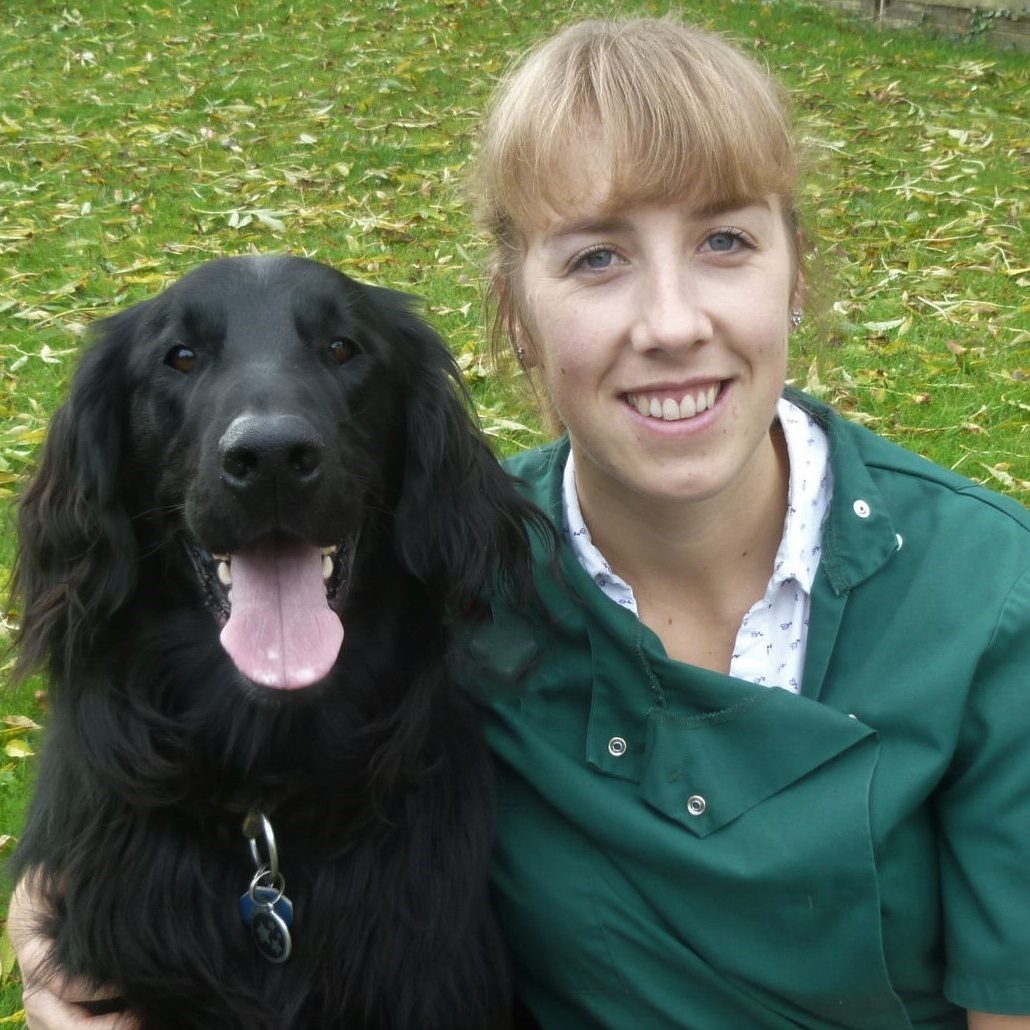
Dr Rebecca MacMillan is a companion animal vet who has always had a passion for writing and client communication. She works in the South West of England and loves complex medical cases.

Dr. Diana Hasler graduated with distinction from the University of Edinburgh Royal (Dick) School of Veterinary Studies in 2018. She has experience working as a small animal vet in general practice, where she has treated many dogs, cats, rabbits, and rodents.
PetsRadar Newsletter
Get the best advice, tips and top tech for your beloved Pets

Ashleigh is Digital Editor on PetsRadar. With over 8 years of experience in print and digital media, she has acted as an editorial lead on a variety of projects, with animal themes a keen interest. As an avid animal lover, you can often find Ashleigh checking out the newest trends in animal care or looking at cute cat videos on TikTok.
- Dr. Diana Hasler BVM&S MRCVS
- Dr Rebecca MacMillanVet
- David CrookesFreelance writer
